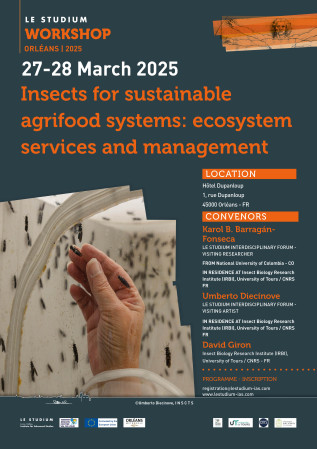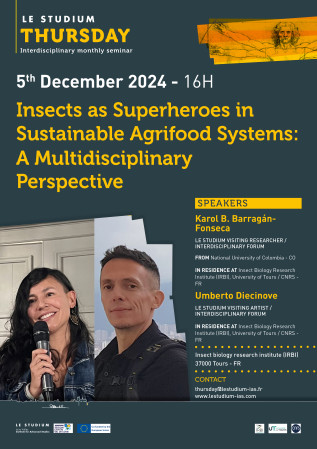Karol B. Barragán-Fonseca
From
National University of Colombia - CO
In residence at
Insect Biology Research Institute (IRBI), University of Tours / CNRS - FR
Host scientist
David Giron
BIOGRAPHY
Karol B. Barragán-Fonseca was born and raised in Colombia. She obtained her degree in veterinary medicine in 2002 and her master's degree in biological sciences in 2005. Her field and laboratory studies contributed to the conservation and production of sustainable systems for wildlife conservation. Since 2008, she has developed her interests in insects as alternative foods for animals and humans. She obtained a PhD in the entomology field from the Wageningen University in 2018. Karol Barragán-Fonseca is convinced that edible insects are a high-quality source of nutrients that can be produced with low environmental impact, helping to reduce climate change while alleviating food crises and rural poverty. She is the founder of the Terrestrial Arthropod Research Center (CINAT) and its spin-off company, EntoPro, at the Universidad Nacional de Colombia (UNAL). Currently, she is an Associate Professor and coordinator of the Insects for Peace initiative to promote social transformation and sustainability in agrifood systems through insects. She is also a member of the group of diplomatic scientists at UNAL, collaborating on projects that address global challenges and promote international cooperation and coordinator of the Insect Network, Latin American Association of Animal Production (ALPA).
PROJECT
Multidimensional assessment of the potential of insects for sustainable agri-food systems
In its 6th assessment report, the Intergovernmental Panel on Climate Change (IPCC) stresses that climate change is having multiple impacts, particularly on biodiversity and food production. The increased risk of heatwaves, extreme rainfall and drought means that the agricultural and agri-food sectors are faced with a number of challenges: providing food in quantity and quality, limiting their environmental impact, reconciling quality and yield, making the farming profession more attractive, adapting to new consumer expectations and supporting sectors with a view to competitiveness and food sovereignty.
This project provides an opportunity to advance research in the innovative field of using insects for sustainable agriculture. It encourages interdisciplinary collaboration between the South (Colombia) and the North (France) with the shared aim of harnessing the potential of insects to create truly circular agri-food systems. By merging the expertise of the two regions, this collaboration seeks to develop sustainable solutions that meet the global challenges of food security, environmental sustainability and biodiversity conservation.
Its aim is to promote the potential of insects for a bioeconomy that is compatible with the challenges of conservation and sustainability. Amplifying the use of insects in the transition to sustainable agriculture requires a quantitative assessment of the ecological, sociological and economic benefits of a very wide range of insects, particularly insects native to the site where the agricultural transition is to take place.
The first building block in this ambition is to identify and quantify the potential of a wide range of insects from an ecological, economic and societal point of view. An initial proof of concept will be carried out on a panel of 100 species covering a wide range of ecosystem services and every continent. Primarily, the focus will be on species produced for food and bioconversion, where only the economic potential is taken into account, neglecting their ecological and societal role, which is specific to each territory.
This project also confronts the agricultural, agri-food and entomoculture sectors with the need to 1) federate players in agriculture, agri-food and ecological sciences; 2) accelerate public-private cooperation and the transfer and valorisation of research results to society and 3) the cross-fertilisation of views from multiple disciplines facilitating experimentation, deployment and societal acceptance of innovative and sustainable solutions.
She will be working in collaboration with the photographer Umberto Diecinove (I N S C T S), who will document her research work and encounters with different players, with the aim of producing a positive and attractive illustration of the societal change that has already begun.
Publications
Final reports
This study presents a multidimensional framework to evaluate the socio-ecological roles (SER) of insects in agrifood systems. Insects contribute to all four categories of ecosystem services: provisioning, regulating, supporting, and cultural, while also posing context-specific challenges. Using a transdisciplinary approach, we assessed 120 insect species across four dimensions: Productive Potential, Ecosystem Potential, Use, and Challenges. Unsupervised machine learning identified species clusters that provide useful insights for context-specific management strategies, including conservation, pest/vector control, wild gathering, and farming. While some species consistently perform well across dimensions, others require more localised or tailored approaches. Rather than offering definitive answers, this framework provides a starting point to support more adaptive and inclusive decision-making for sustainable insect use. It contributes to balancing productivity, biodiversity, and cultural relevance, while guiding future research and policy efforts aligned with agri-food system transformation and biodiversity goals.


